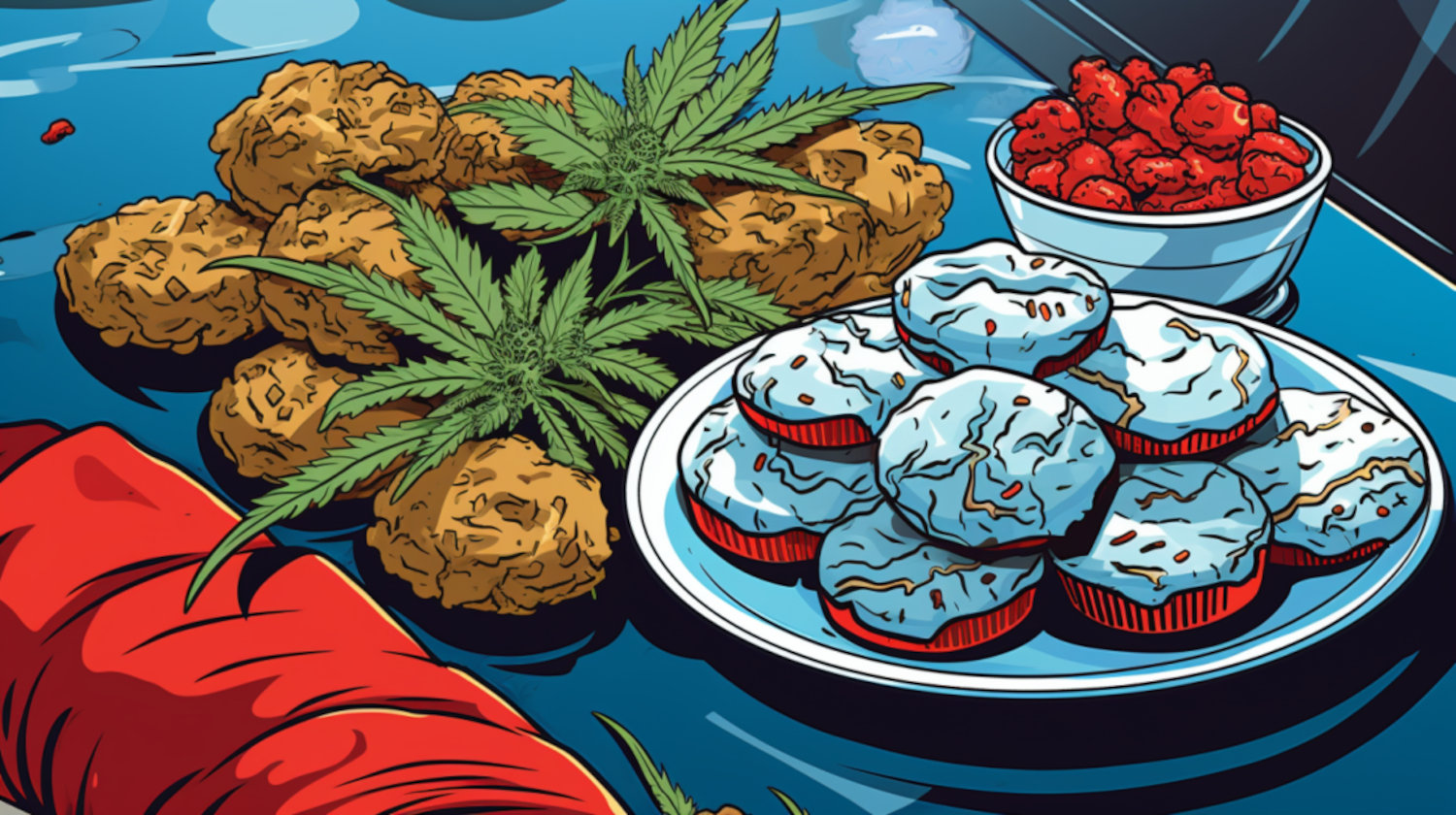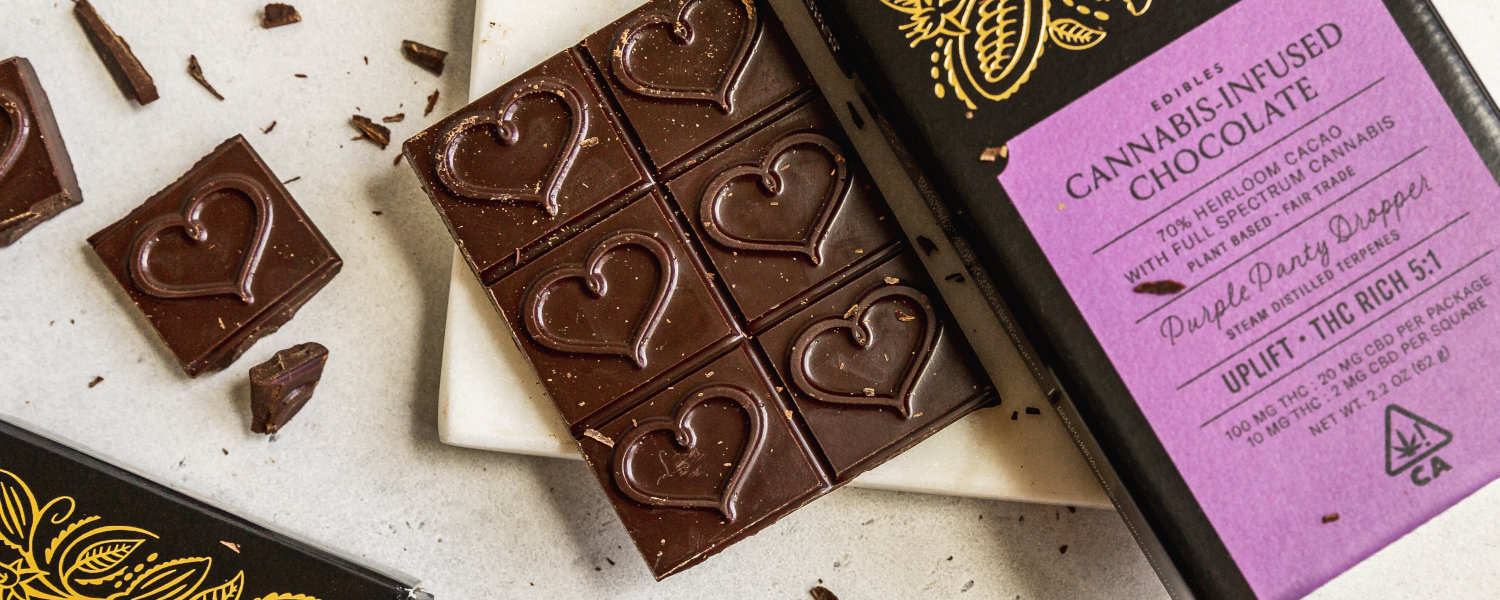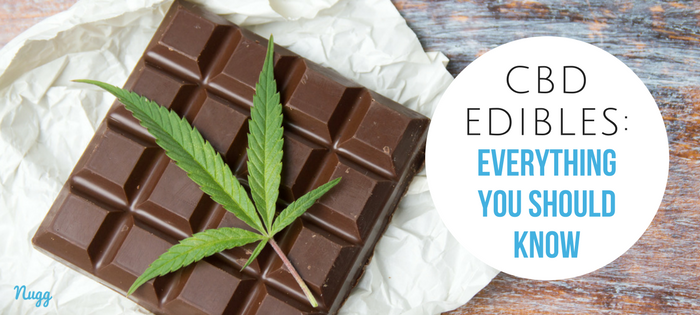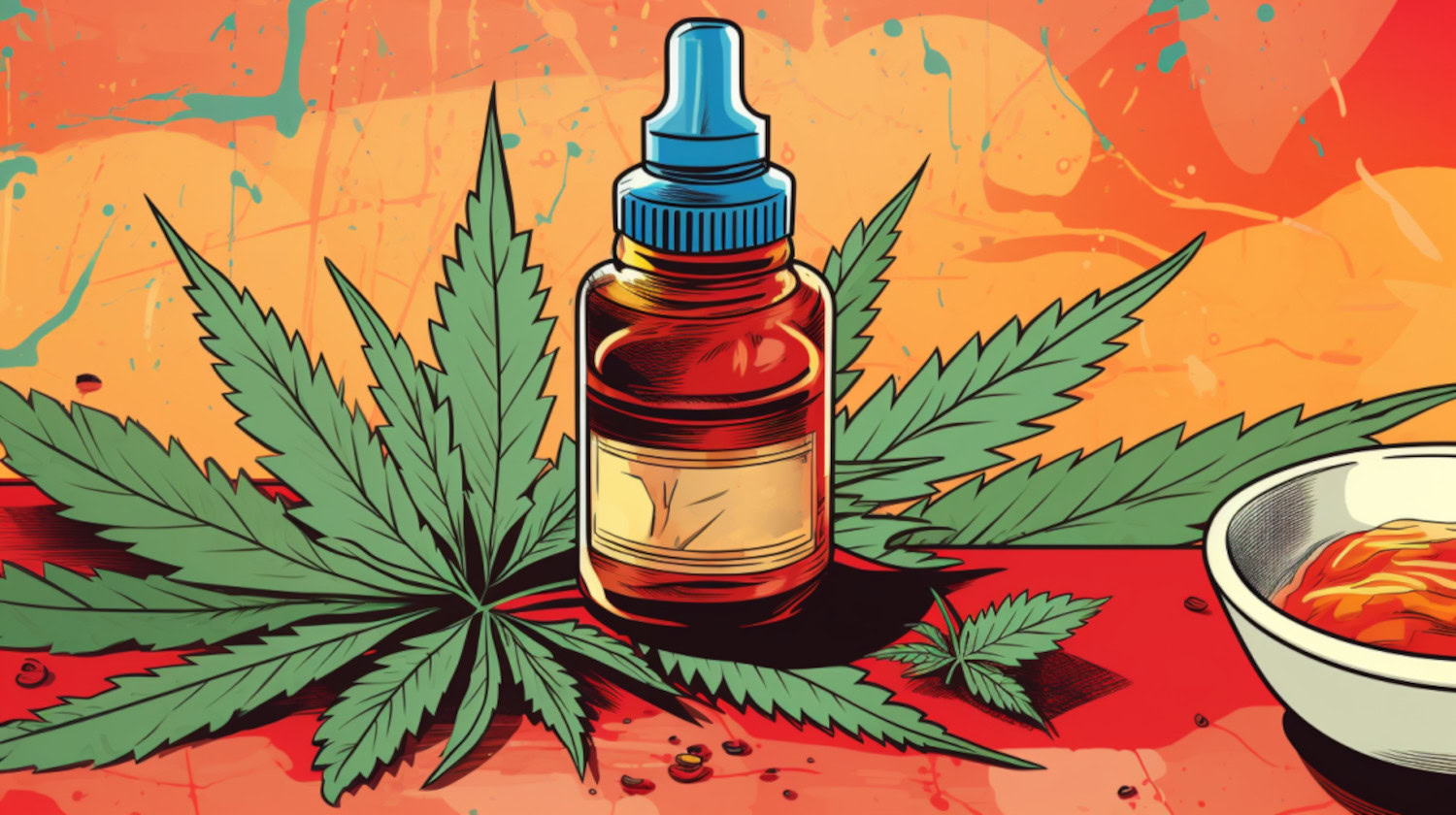In This Article
- What is a THC Edible?
- What’s the Average THC Level in THC Edibles?
- What Are CBD Gummies or Edibles?
- Which is Better: Dispensary CBD Edibles or Ones Sold Online?
- Difference Between CBD and THC Edibles
- Content
- Effects
- Uses
- Legality
- Drug tests
- Safety
- Are there edibles with both THC and CBD?
- Can you build up a tolerance to CBD edibles like THC?
- Can you take THC and CBD gummies at the same time?
- References
Cannabis edibles continue to surge in popularity as more states legalize the plant. Edibles have long since been the go-to alternative to smoking or vaping. With a wide array of options available, navigating the landscape of CBD gummies, THC edibles, and more can feel perplexing, leaving many to wonder: What's the difference between CBD and THC edibles?
There are high-THC, various THC:CBD ratios, and federally legal CBD edibles, but what are the differences between them?
It’s important to understand the distinctions between CBD gummies, THC edibles, and the consumables in between. There are also advantages of edibles over smoking or vaping cannabis.
What is a THC Edible?
THC edibles are food or drink products infused with THC. These edibles can take various forms, including gummies, chocolates, cookies, and more.1
When consumed, THC interacts with the body's endocannabinoid system. The result is intoxicating effects that vary by individual. Common effects include euphoria, relaxation, an altered perception of time, and increased appetite.
The effects of THC edibles often take longer to kick in compared to smoking or vaping cannabis. This is due to their need to metabolize in the digestive system first. However, the effects tend to last longer.2
It's always important to consume THC edibles responsibly and in moderation. Their effects may be potent and long-lasting, but consuming too much may lead to adverse reactions. While edibles are mild, starting low and slow is always best to avoid adverse effects entirely.
What’s the Average THC Level in THC Edibles?
The average THC content in an edible varies by state. Typically, edibles range from 5mg to 10mg per dose and up to 100mg per package. Some states may have no package limit but still require 10mg doses. Check with your state laws to determine what the typical and maximum THC per serving and package is.
What Are CBD Gummies or Edibles?

CBD gummies are a type of edible infused with CBD (cannabidiol), which is the most abundant non-intoxicating compound in cannabis. Outside of gummies, CBD edibles come in several other forms, including chocolates, beverages, and more.
However, there’s a difference between CBD edibles available at licensed dispensaries and the federally legal ones. Typically sold online, the latter are hemp-derived CBD products.
Dispensary CBD products may occasionally be mislabeled due to a warehouse error, which is typically followed by a recall and the cessation of sales of that product. Online CBD products, on the other hand, may have unknown levels of THC due to a lack of accurate testing and regulations. This can pose a risk to unsuspecting customers.
Which is Better: Dispensary CBD Edibles or Ones Sold Online?
Typically, products from licensed dispensaries are reliably safer. Products sold online don’t have to meet the same level of testing or rigorous safety standards.3 One study found that, when tested, only 30% of CBD products purchased online were accurately labeled.4
Some online CBD brands do go the extra mile, but it’s not a guarantee. However, there are some notable exceptions. Companies that operate in legal dispensaries, like WYLD, Pure Beauty, Sun God Medicinals, and High Desert Pure, are more likely to follow state regulatory standards, even if they also sell their federally legal products online.
Difference Between CBD and THC Edibles

CBD and THC edibles are both cannabis-infused food products. While similar, there are some stark differences between the two.
Content
Both THC and CBD-dominant edibles can contain other cannabinoids. In fact, it's not uncommon for an edible to include an even ratio of THC and CBD in some legal states. So do all CBD gummies have THC?
Licensed and unlicensed cannabis companies are using the Farm Bill loophole to produce edibles that contain less than 0.3% delta-9 THC by weight. These edibles can vary in package limit and are based on unit weight. Therefore, a gummy can have 10mg of THC as long as it contains less than 0.3% THC by weight.
Either type of edible can be a whole-plant, extract, or isolate infusion.
- Whole-plant infusions are used in edibles with infused butter or oil.
- Extract infusions are made with live resin or hash rosin.
- Isolate infusions are made with single molecules.
Package limits also vary by state, but CBD typically has no limit. Edible packages may contain up to 500mg of CBD or more, while THC is typically limited to 100mg per package.
While serving sizes are often the same for both CBD and THC edibles, CBD products don't have a limit per dose. A CBD edible label may suggest 25mg per dose or sometimes more.
Effects
The most significant difference in effects is that THC is psychotropic, while CBD is not. It is unlikely to experience a “high” from CBD edibles unless there’s more than CBD in the edible.
However, if a CBD brand is using the loophole to produce CBD gummies with high levels of THC, it’s possible to get high from the product. These effects may cause intoxication in those who are especially sensitive to THC.
It’s important to verify the source of the CBD edibles, including lab reports. The use of THC in edibles should always be closely supervised and controlled.
Uses
Other than Epidiolex and other approved cannabis-based drugs, no cannabis product is considered a treatment for any condition.5 Research is ongoing, with promising results for a variety of symptoms. Patients may experience several benefits from using THC gummies or CBD gummies. Which product a patient might choose depends on various factors, including personal preference, sensitivity or tolerance to THC, and more.
Based on anecdotal evidence and preliminary research, users could expect that:
- CBD gummies help them relieve symptoms of stress and/or anxiety.
- CBD’s possible pain-relieving properties, due to the cannabinoid’s anti-inflammatory effects, may reduce certain types of pain.
- CBD products may help some individuals improve their sleep quality after use.
Everyone is different, so CBD may not demonstrate these effects in an individual.6 CBD gummies may deliver completely different results, depending on the user. It'll likely take experimenting with various CBD edibles, dosages, and cannabinoid ratios to find the one that delivers the preferred effects.
Legality
Technically, CBD gummies are not legal anywhere, with the exception of medical and adult-use dispensaries. The FDA states that selling CBD-infused food or beverages is illegal.
However, CBD oil (also called tinctures) and smokable hemp flower, depending on the state, are legal.
Some states have specific rules against hemp-derived CBD edibles, such as California, if they’re sold outside of a licensed dispensary. The CBD edibles sold in dispensaries are often cannabis-derived by federal definition, not hemp-derived.
Can you bring CBD gummies on a flight or cruise?
The TSA isn’t actually looking for CBD oil or gummies. Screening procedures at the airport are focused on security and designed to detect potential threats to flights and/or passengers.
As a result, TSA officers don’t actively search for illegal products. However, they generally have to refer the matter to local law enforcement if they're discovered. Refer to your local area’s laws and regulations. If you’re flying nationally, check the rules of the state you’re in and the one you’re flying to. If you’re flying internationally, you should probably leave all hemp-derived and cannabis-derived products at home.
Cruises are typically subject to different laws and are not based in American ports. Therefore, to be safe, leave CBD products at home. There are not currently any CBD-friendly cruises.
Can you transport CBD edibles for personal use across state lines?
Transporting federally legal CBD gummies across state lines is allowed. If traveling through or to a state with different restrictions on CBD products, it’s good to remain cautious. Some states have stricter enforcements on CBD edibles and other hemp-derived products, such as being 21 or older instead of 18 years old.
Drug tests
When it comes to drug testing and CBD gummies, there are several factors to consider. CBD is non-intoxicating and also a separate cannabinoid entirely from THC. CBD itself doesn't show up on standard drug tests because tests screen for THC and its metabolites.
Can using CBD edibles result in a false positive? Some CBD products may contain trace amounts of THC. Hemp plants may legally contain 0.3% delta-9 THC or less. That means some CBD products can lead to a positive result on a drug test. If an individual consumes CBD in high doses over a prolonged period, they should be aware of the possibility of a positive result.
How long does THC stay in the body compared to CBD?
As with all substances, THC can stay in the body for varying lengths of time. The duration depends on factors like frequency of use, metabolism, dosage, and more.
Urine tests look for THC metabolites, including THC-COOH. These metabolites remain detectable from several days to a few weeks after use. A higher frequency of use or higher body weight may result in a positive test for even longer.
CBD might be detectable in urine for approximately three to five days after use. The compound generally metabolizes quicker than THC. However, CBD metabolites aren't typically tested for standard drug screenings.
While CBD itself is unlikely to result in a positive drug test, it's good to be cautious with any CBD products. CBD gummies may contain trace amounts of THC, which may lead to a positive result on drug tests.
Safety
As with all things, there are risks associated with the overconsumption of CBD or THC edibles. While you won't overdose on CBD, it can be overconsumed — especially when it's in a delicious gummy or edible form. While CBD edibles are typically less severe than THC edibles, adverse effects are possible if you consume too much.
CBD gummies are often sugary products. In general, overeating sweet foods can result in symptoms like nausea and gastrointestinal discomfort. Though CBD is generally well-tolerated, users should be mindful of consumption.7 Adhere to the recommended serving size until you know how you'll react to CBD.
As for THC edibles, it's not uncommon for new users, or even someone who takes a higher dose than recommended, to overconsume. Adverse effects are typically mild and temporary but can still be incredibly uncomfortable. Possible adverse reactions include:
- Extreme sedation
- Anxiety
- Paranoia
- Hallucinations
- Rapid heart rate
- Nausea
Research reveals that high doses of CBD might increase the chance of the adverse effects of THC.8
The solution is to start with low doses and be aware of the potential risks ahead of time. Wait for the effects to fully manifest before considering another dose. If you do have a bad edible experience, learn how to recover and take steps to avoid bad experiences in the future.

Are there edibles with both THC and CBD?
Yes, there are edibles available that contain both THC and CBD. Some are 1:1 products with an equal ratio of THC to CBD, while others are higher ratios like 2:1 or even 20:1. These products combine the potential effects of both cannabinoids to offer a unique blend of both.
Research suggests a combination of THC, CBD, and other cannabinoids may have therapeutic potential for conditions like Alzheimer's. Other research shows that low-THC or 1:1 CBD:THC products may possess anxiety-reducing properties.9 CBD may mitigate some of the anxiety-triggering properties of THC.10
Individual responses do vary, and more research is necessary to discover what or what else cannabinoid blends are good for.
Can you build up a tolerance to CBD edibles like THC?
Those familiar with a THC tolerance may wonder if it’s possible to experience the same tolerance to CBD eventually. It can feel frustrating when THC edibles don’t get you high, and you likely want a better experience from CBD edibles.
Developing a CBD tolerance is possible. One study using a 20:1 CBD:THC ratio suggested that a subset of individuals may experience reduced efficacy of CBD. However, only 25% of the patients in the study required an increase in CBD due to an increase in their tolerance. Research hypothesizes that factors such as the presence of THC may contribute to the development of tolerance to CBD products, as opposed to using isolated CBD.11
Can you take THC and CBD gummies at the same time?
It is possible to take THC and CBD gummies at the same time. In fact, there are products available that contain both THC and CBD in varying ratios. How the combo alters the effects depends on the ratio, the individual’s tolerance, and more.
Some research suggests that CBD may not significantly change THC's effects, even when taken together.12 A study found that cannabis smoked with high CBD didn't produce different ratings of 'stoned' than cannabis with low CBD. This research may have stemmed from the potential misconception that taking CBD can help "sober you" from THC. Conflicting results from studies underscore just how different everyone's individual physiology is.13
References
- Spindle TR, Bonn-Miller MO, Vandrey R. Changing landscape of cannabis: novel products, formulations, and methods of administration. Curr Opin Psychol. 2019;30:98-102. doi:10.1016/j.copsyc.2019.04.002 ↩︎
- Barrus DG, Capogrossi KL, Cates SC, et al. Tasty THC: Promises and Challenges of Cannabis Edibles. Methods Rep RTI Press. 2016;2016:10.3768/rtipress.2016.op.0035.1611. doi:10.3768/rtipress.2016.op.0035.1611 ↩︎
- Li J, Carvajal R, Bruner L, Kaminski NE. The current understanding of the benefits, safety, and regulation of cannabidiol in consumer products. Food Chem Toxicol. 2021;157:112600. doi:10.1016/j.fct.2021.112600 ↩︎
- Bonn-Miller MO, Loflin MJE, Thomas BF, Marcu JP, Hyke T, Vandrey R. Labeling Accuracy of Cannabidiol Extracts Sold Online. JAMA. 2017;318(17):1708-1709. doi:10.1001/jama.2017.11909 ↩︎
- Hilderbrand RL. Hemp & Cannabidiol: What is a Medicine?. Mo Med. 2018;115(4):306-309. ↩︎
- Pagano C, Navarra G, Coppola L, Avilia G, Bifulco M, Laezza C. Cannabinoids: Therapeutic Use in Clinical Practice. Int J Mol Sci. 2022;23(6):3344. Published 2022 Mar 19. doi:10.3390/ijms23063344 ↩︎
- Millar SA, Maguire RF, Yates AS, O’Sullivan SE. Towards Better Delivery of Cannabidiol (CBD). Pharmaceuticals. 2020; 13(9):219. https://doi.org/10.3390/ph13090219 ↩︎
- Zamarripa CA, Spindle TR, Surujunarain R, et al. Assessment of Orally Administered Δ9-Tetrahydrocannabinol When Coadministered With Cannabidiol on Δ9-Tetrahydrocannabinol Pharmacokinetics and Pharmacodynamics in Healthy Adults: A Randomized Clinical Trial. JAMA Network Open. 2023;6(2):e2254752. doi:https://doi.org/10.1001/jamanetworkopen.2022.54752 ↩︎
- Coles M, Steiner-Lim GZ, Karl T. Therapeutic properties of multi-cannabinoid treatment strategies for Alzheimer's disease. Front Neurosci. 2022;16:962922. Published 2022 Sep 2. doi:10.3389/fnins.2022.962922 ↩︎
- Sharpe L, Sinclair J, Kramer A, de Manincor M, Sarris J. Cannabis, a cause for anxiety? A critical appraisal of the anxiogenic and anxiolytic properties. Journal of Translational Medicine. 2020;18(1). doi:https://doi.org/10.1186/s12967-020-02518-2 ↩︎
- Uliel-Sibony S, Hausman-Kedem M, Fattal-Valevski A, Kramer U. Cannabidiol-enriched oil in children and adults with treatment-resistant epilepsy-does tolerance exist? Brain and Development. 2020;43(1):89-96. doi:https://doi.org/10.1016/j.braindev.2020.06.018 ↩︎
- Haney M, Malcolm RJ, Babalonis S, et al. Oral Cannabidiol does not Alter the Subjective, Reinforcing or Cardiovascular Effects of Smoked Cannabis. Neuropsychopharmacology. 2015;41(8):1974-1982. doi:https://doi.org/10.1038/npp.2015.367 ↩︎
- Englund, A., Oliver, D., Chesney, E. et al. Does cannabidiol make cannabis safer? A randomised, double-blind, cross-over trial of cannabis with four different CBD:THC ratios. Neuropsychopharmacol. 2023;48,869–876. https://doi.org/10.1038/s41386-022-01478-z ↩︎
The information in this article and any included images or charts are for educational purposes only. This information is neither a substitute for, nor does it replace, professional legal advice or medical advice, diagnosis, or treatment. If you have any concerns or questions about laws, regulations, or your health, you should always consult with an attorney, physician or other licensed professional.




